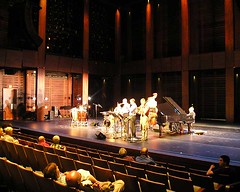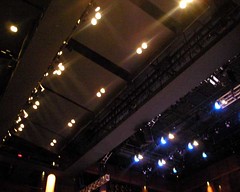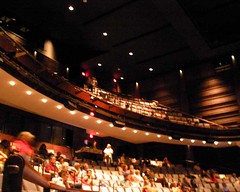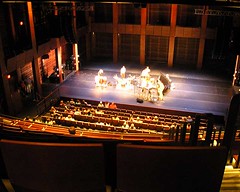
Twenty-five years ago, a fairly forgetable movie called
Yes, Giorgio! played in Oklahoma City, telling the story of a opera star who loses his voice before an important concert, then falls in love with the doctor who treats him. The operaphiles—of which I was not yet one—were all excited because the main character was played by this fat Italian guy who was, apparently, one of their big opera stars.
We were just college students then, and, while we liked classical music and sang in school and church choirs, we weren't particularly well-versed in opera. Sure, there were a lot of opera melodies that were familiar tunes (thanks to Bugs Bunny and others), but we weren't exactly experts in the genre. But, off we went, and it was that night that I was first exposed to Luciano Pavarotti.
Also for the first time, I heard in that movie a little aria from a Puccini opera
Turandot called "Nessun dorma"—None Shall Sleep. It was one of the songs from one of Pavarotti's standard roles as Prince Calàf, but it hadn't yet developed the "signature song" status it would get after the 1990 World Cup performance. And I liked it.
Nessun dorma! Nessun dorma! Tu pure, o Principessa, nella tua fredda stanza guardi le stelle che tremano d'amore e di speranza. Ma il mio mistero è chiuso in me, il nome mio nessun saprà! No, no, sulla tua bocca lo dirò, quando la luce splenderà! Ed il mio bacio scioglierà il silenzio che ti fa mia. Dilegua, o notte! Tramontate, stelle! Tramontate, stelle! All'alba vincerò! Vincerò! Vincerò!
None shall sleep! None shall sleep! Even you, o Princess, in your cold room, watch the stars, that tremble with love and with hope. But my secret is hidden within me, my name no one shall know. No, no, on your mouth I will tell it when the light shines. And my kiss will dissolve the silence that makes you mine! Vanish, o night! Set, stars! Set, stars! At dawn, I will win! I will win! I will win!
The performance was pretty phenomenal, and I was particularly intrigued with the ending: Pavarotti didn't sing "veen-chay-ro," but "vee-nah-chay-ro," adding a little shadow vowel syllable to his native Italian language, giving himself essentially a springboard to catapult him to that long, glorious high B that is the penultimate note of the aria. That's the way everyone sings it now.
Now that Pavarotti was on my radar screen, I started listening to his music, and marveling at his amazingly easy, pure tenor voice. There was never any struggle, never any pressure, never any pinched sound, never any heroic effort. He just floated those high notes on the air.
After that 1990 soccer game, it seems like everyone was a Pavarotti fan. In fact, it got to be next to impossible to get tickets to an opera or a concert when he was on the bill. Ticket prices skyrocketed—one Met gala had tickets as high as $1,875 each. Yet, it was worth it. As magnificent as his voice sounds on television or on a CD, there was nothing quite like hearing it live and in person.
The last time I heard Pavarotti in person was probably back in 1994 or 95 singing at the Metropolitan Opera in New York in a Verdi opera called
I Lombardi. I almost didn't get to go, because the performance was long sold-out, and I wasn't able to pull any strings at the box office to get one, even at inflated prices. Fortuitously, on my flight to New York, I ran into Samuel Ramey—also en route to the Met for
Lombardi, but to sing it—and bewailed my plight that I wouldn't be able to hear Sam sing because all the Pavarotti fans had bought up all the tickets. Sam said he'd take care of it, and he did: he got me a company pass that put me in the first balcony in a fabulous seat. After the long performance, I went backstage to Sam's dressing room to thank him for the ticket and get him to autograph my program. As I left, I saw this huge line going to Pavarotti's dressing room, so, even though we were only supposed to be backstage when we were on the "approved" guest lists, I decided to seize the moment, get in line, and meet
il Maestro.
Once I was in the Presence, I was surprised to see how short he really is. When he is on stage, his voice and his personality made him larger than life, but that was merely an illusion. It was also so obvious that he was dying his eyebrows and beard dark, dark black, as though he wanted to avoid having to get another headshot taken, so he just changed himself to match the old photograph. He was quite patient and quite gracious as the endless fans all came to pay their respects and seek his signature. His staff had to encourage people to move along in the line and not monopolize his time. When it came time for me to greet him, he looked me up and down warily, then in his accented English said, "You sing?" I don't know how he would know to ask me that, but after my confession, he said, "Ah. Remember always to be to the music sincere."
Just a few hours ago, Pavarotti lost his battle with cancer. Today, no doubt, all the news agencies will offer retrospectives of his life and career, probably endlessly playing clips from "Nessun dorma" or "Che gelida manina." Certainly, he was the most important opera singer since Enrico Caruso, he was
the modern opera superstar, he was the first cross-over musical artist, he was a leader in bringing opera to the American masses, he made "Nessun dorma" almost a household melody, he was the quintessential
divo.
Calàf sings "none shall sleep," and ultimately declares that in his struggle with Princess Turandot, he will win—
vincerò. Well, the cancer prevailed in this round with Pavarotti, but it didn't win. It didn't win at all, because that voice will live forever in the recordings and videos and the hearts and minds of all who heard and loved Luciano Pavarotti.
Resto nella pace, Luciano.
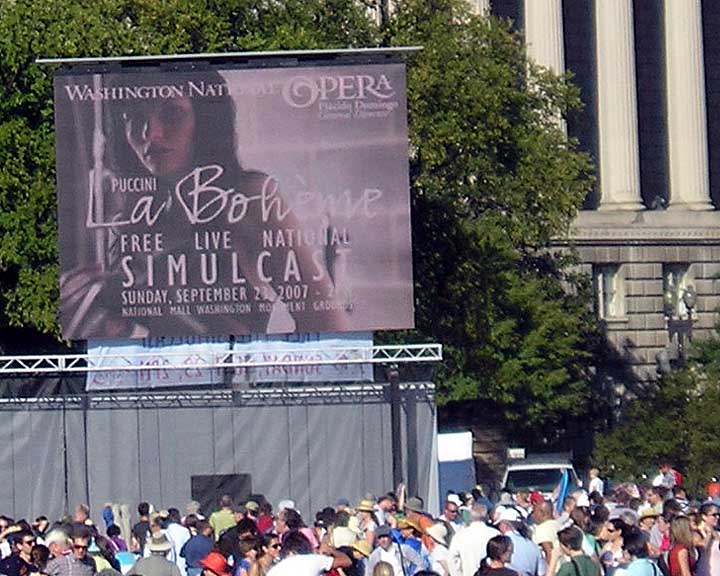
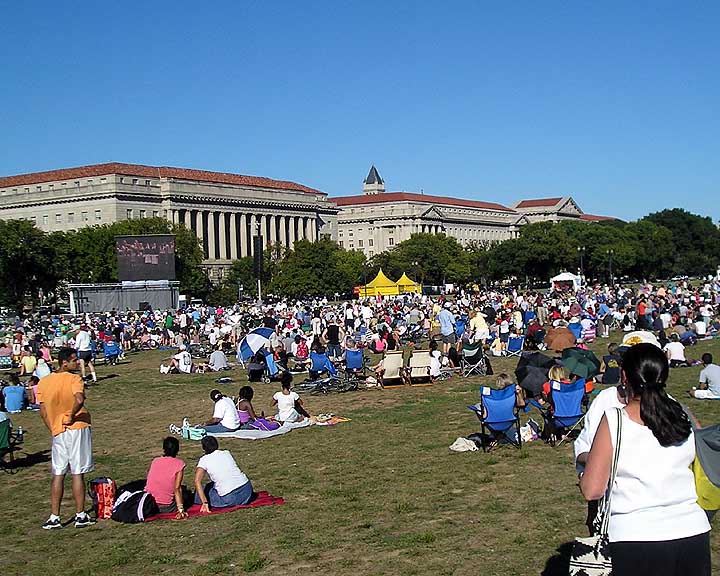
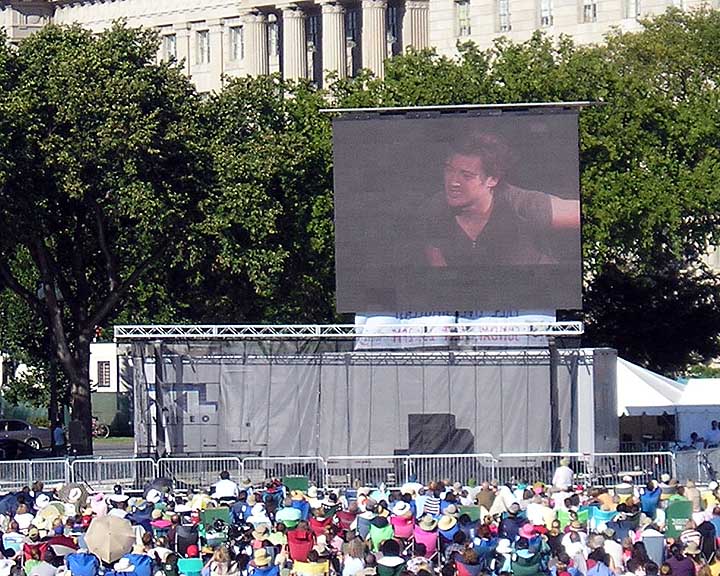
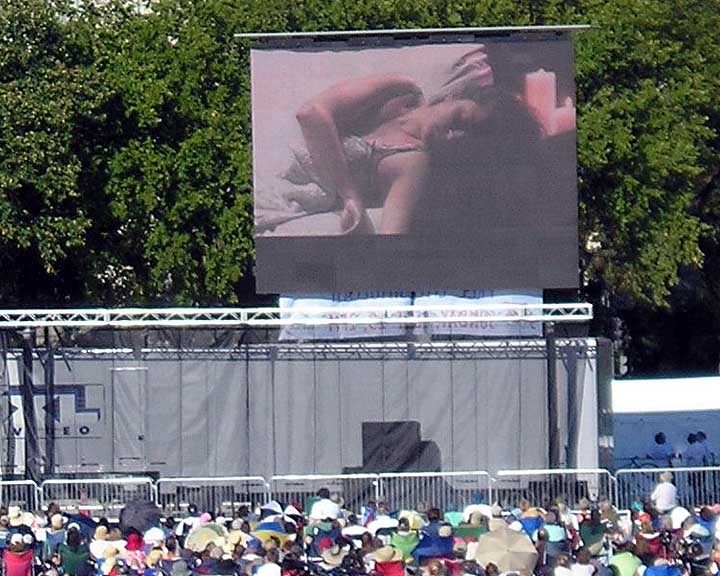
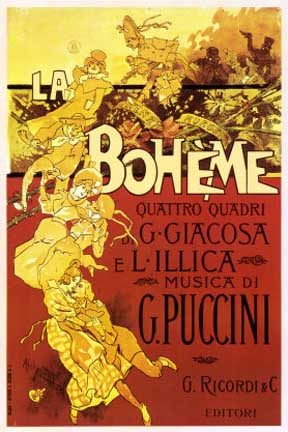 Who wants to go to the opera with me? It's free!
Who wants to go to the opera with me? It's free!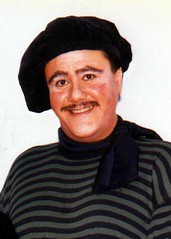 For those of you not in the D.C. metro area, there are a number of colleges showing the simulcast as well. More details are on WNO's Web site, but I think the schools are: Brown, Bryn Mawr, Cumberland School of Law, Duke, New York University, North Carolina School of the Arts, Ohio University, Princeton, Rice, Southern Virginia Higher Education Center, Temple, Tulane, Union College, U. S. Military Academy, Virginia Tech, Wellesley, and the Universities of Alabama, Arkansas, Colorado, Florida, Massachusetts–Amherst, North Carolina, Oklahoma, Richmond, Virginia and Washington.
For those of you not in the D.C. metro area, there are a number of colleges showing the simulcast as well. More details are on WNO's Web site, but I think the schools are: Brown, Bryn Mawr, Cumberland School of Law, Duke, New York University, North Carolina School of the Arts, Ohio University, Princeton, Rice, Southern Virginia Higher Education Center, Temple, Tulane, Union College, U. S. Military Academy, Virginia Tech, Wellesley, and the Universities of Alabama, Arkansas, Colorado, Florida, Massachusetts–Amherst, North Carolina, Oklahoma, Richmond, Virginia and Washington.
